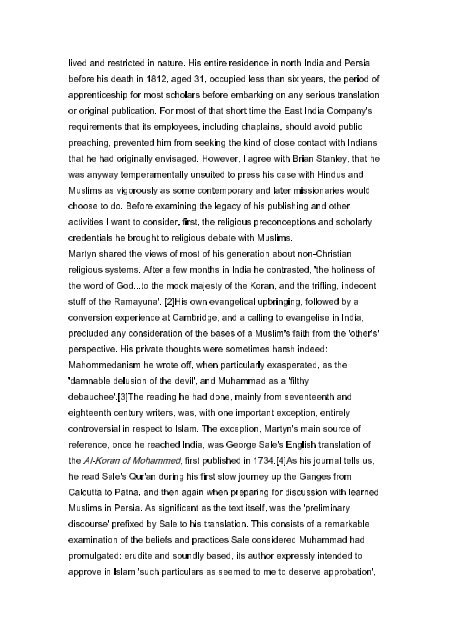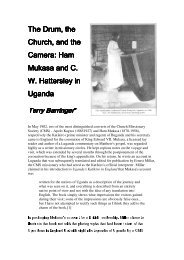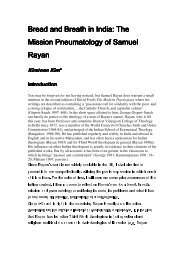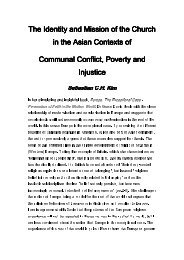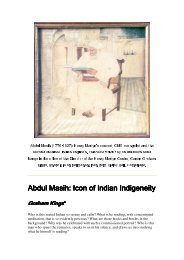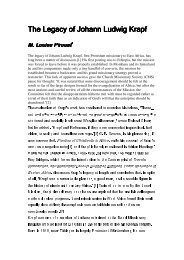the legacy of henry martyn to the study of india's muslims and islam ...
the legacy of henry martyn to the study of india's muslims and islam ...
the legacy of henry martyn to the study of india's muslims and islam ...
You also want an ePaper? Increase the reach of your titles
YUMPU automatically turns print PDFs into web optimized ePapers that Google loves.
<strong>and</strong> restricted in nature. His entire residence in north <strong>and</strong> Persia before his death in 1812, aged 31, occupied less than six years, <strong>the</strong> period <strong>of</strong> apprenticeship for most scholars before embarking on any serious translation<br />
original publication. For most <strong>of</strong> that short time <strong>the</strong> East India Company's requirements that its employees, including chaplains, should avoid public lived<br />
prevented him from seeking <strong>the</strong> kind <strong>of</strong> close contact with Indians that he had originally envisaged. However, I agree with Brian Stanley, that he was anyway temperamentally unsuited <strong>to</strong> press his case with Hindus <strong>and</strong> Muslims as vigorously as some contemporary <strong>and</strong> later missionaries would choose <strong>to</strong> do. Before examining <strong>legacy</strong> <strong>of</strong> his publishing <strong>and</strong> o<strong>the</strong>r preaching,<br />
I want <strong>to</strong> consider, first, <strong>the</strong> religious preconceptions <strong>and</strong> scholarly credentials he brought <strong>to</strong> religious debate with Muslims. Martyn shared <strong>the</strong> views <strong>of</strong> most <strong>of</strong> his generation about non-Christian activities<br />
systems. After a few months in India he contrasted, '<strong>the</strong> holiness <strong>of</strong> <strong>the</strong> word <strong>of</strong> God...<strong>to</strong> <strong>the</strong> mock majesty <strong>of</strong> <strong>the</strong> Koran, <strong>and</strong> <strong>the</strong> trifling, indecent stuff <strong>of</strong> <strong>the</strong> Ramayuna'. [2]His own evangelical upbringing, followed by a conversion experience Cambridge, <strong>and</strong> a calling <strong>to</strong> evangelise India, precluded any consideration <strong>the</strong> bases <strong>of</strong> a Muslim's faith from 'o<strong>the</strong>r's' religious<br />
His private thoughts were sometimes harsh indeed: Mahommedanism he wrote <strong>of</strong>f, when particularly exasperated, as <strong>the</strong> 'damnable delusion <strong>of</strong> <strong>the</strong> devil', <strong>and</strong> Muhammad a 'filthy debauchee'.[3]The reading he had done, mainly from seventeenth <strong>and</strong> eighteenth century writers, was, with important exception, entirely perspective.<br />
in respect <strong>to</strong> Islam. The exception, Martyn's main source <strong>of</strong> reference, once reached India, was George Sale's English translation <strong>of</strong> <strong>the</strong> Al-Koran <strong>of</strong> Mohammed, first published in 1734.[4]As his journal tells us, controversial<br />
read Sale's Qur'an during his first slow journey up <strong>the</strong> Ganges from Calcutta <strong>to</strong> Patna, <strong>and</strong> <strong>the</strong>n again when preparing for discussion with learned Muslims Persia. As significant as <strong>the</strong> text itself, was <strong>the</strong> 'preliminary discourse' prefixed by Sale <strong>to</strong> his translation. This consists <strong>of</strong> a remarkable examination <strong>of</strong> <strong>the</strong> beliefs <strong>and</strong> practices Sale considered Muhammad had he<br />
erudite <strong>and</strong> soundly based, its author expressly intended <strong>to</strong> approve Islam 'such particulars seemed <strong>to</strong> me <strong>to</strong> deserve approbation', promulgated:


